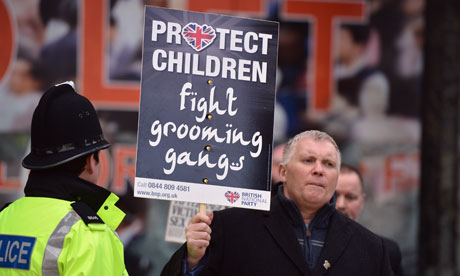Understanding how paedophiles operate is key to helping the children whose lives they damage

A BNP protest outside Liverpool crown
court during the Rochdale trial. Race was not the issue here, says Janet
Foulds. Photograph: Christopher Furlong/Getty Images
White men abuse children too, and understanding how paedophiles operate is key to helping the children whose lives they so cruelly damage. The temptation to put the stone down so that you don't have to deal with it can be overwhelming, but social workers need to be supported to help children who are at risk of organised grooming.
Cases such as Rochdale understandably attract a lot of media interest. The crimes committed are shocking, and the damage done to the children concerned is horrific.
In my experience as a child protection social worker, the focus on race is misleading, and actually harmful in dealing with the wider issues of child protection, sexual abuse and sexual exploitation.
I say this for the following reasons:
• Child sexual abuse, exploitation and trafficking cut across all cultures, class boundaries and occupations.
• There are elements common to most cases of sexual abuse – abuse of power, grooming, coercion, targeting of vulnerable children, discrediting and silencing of victims, bribery, the use of gifts and/or threats, and the use of drugs or substances to subdue or encourage dependency.
• Common to almost every victim are feelings of worthlessness, the sense of being somehow to blame and a feeling that they were treated as objects rather than people. Sex offenders treat children as objects for their own gratification rather than children or human beings.
• The extent to which offenders organise their activities varies considerably. In my practice, I have encountered a wide range of abuse: from one-to-one, two adults/parents acting together, inter-generational family groups with multiple children, similar family groups with friends involved, religious groups, organised gangs and secretive cults.
• It is common to find like-minded individuals forming "networks" to deal in abusing children, making and distributing pornography, and procuring young people for prostitution and child abuse. Offenders will identify others in the community or through the internet who share their interests, enabling them to work together to entrap vulnerable youngsters. For example, we have known groups of offenders to cluster around a shared job.
In light of this, it is not surprising when groups of offenders reflect the demographic of the population where they live. The Rochdale men seem to have had common occupations, and they probably knew each other. I would bet that there are other organised groups of offenders in that area who are not of Asian heritage.
The stereotyping – of the offenders and the children and young people involved – poses a real danger. It is just too comfortable for some people to think a particular group of offenders are involved, rather than thinking about the problems in terms of, say, gender. Why are so many crimes of sexual abuse and violence perpetrated predominantly by men (of all cultures) against children in the UK?
What does it tell us about our attitudes towards women and children? The image of young teenage girls walking the streets often elicits an underlying punitive response – such as "They were asking for it" – rather than seeing those youngsters as children in need of protection. Let us not forget that boys, too, can be victims of abuse.
So many of the victims of this kind of sexual exploitation have already been victims of abuse at a younger age. They may be very needy emotionally and therefore become more vulnerable to grooming.
We all need to remain open minded to the role played by women involved in sexual abuse, whether directly or in assisting males. Women are active in some cases in procuring children for these purposes; they are not all passive victims.
The focus on the men involved in Rochdale takes the attention away from the plight of the children. We need to avoid falling into the trap of blaming one group when the issue cuts across all ages, cultures and communities. The default position for people facing the trauma of child abuse is still denial and minimising. It helps us to cope. The truth about prevalence is uncomfortable and needs to be owned by everyone.
Most offenders I have known are white, heterosexual men. We need to learn much more about how offenders organise themselves. We also need to continue to highlight the need for services for these children. We need preventive work, good training for professionals and access to support services to help children to deal with their experiences. To ignore or diminish the traumatic sexualisation of children is to store up many problems for them, other children and for mental health services in the future.
Janet Foulds is a specialist social worker in child protection and therapeutic work and a member of BASW
http://www.guardian.co.uk/social-care-network/2012/may/17/child-grooming-social-workers?newsfeed=true

Nice post.It help us in awaring.
ReplyDeleteThanks and thank you for stopping by. Come back anytime. :) Rosie
Delete